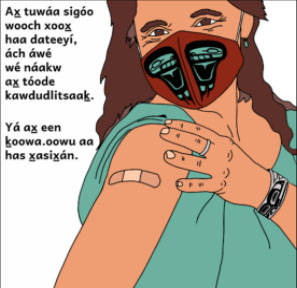COVID-19 vaccine information will now be available in a number of Alaska Native languages, according to a Thursday press release from the Alaska Public Interest Research Group.
The Alaska Native Tribal Health Consortium, Native Peoples Action Community Fund, Alaska Public Interest Research Group, Alaska Department of Health and Social Services and various Alaska Native language experts collaborated over two months on seven Alaska Native Language Panels focused on Ahtna, Yugtun/Cugtun, Gwichyaa Zhee Gwich’in, Neets’aii Gwich’in, Inupiaqtun, Lingít and Denaakk’e languages.
The panels developed messages and provided creative direction for posters, berry buckets, stickers, videos and public service announcements to be shared throughout Alaska, according to the Alaska Public Interest Research Group’s Facebook page.
Information on the panels and links to materials are available on the website for the project.
“I’m really proud of how well Alaska has gotten out the vaccines, and I think it’s still important for us to communicate, for those who haven’t gotten it yet, in our languages, why it’s important, but also, to make sure that they have the information to make an informed decision,” Annauk Olin, a member of the Inupiaqtun Language Panel, said in the release.
The organizations worked in tandem for two months to make the translation project possible. According to the release, most of the organizations have also done work on translating the 2020 census, COVID-19 safety information, and messaging about the 2020 general election.
“The goal of this project is to uplift Alaska Native languages, create space for discussion and healing, and make sure our communities have access to factual and trustworthy information about the vaccine in their languages,” the release stated. “In particular, providing Elders with information in their first language is crucial to ensuring equitable access.”
The language experts discussed the ways vaccines are being distributed in different communities throughout Alaska, and the prevalence of vaccine hesitancy. They concluded that language translation was crucial to ensure Native-speaking people can make independent decisions about their health as well as explore historical healing and build relationships with the health care system.
“A beautiful analogy was made to the way that when a family harvests food such as moose or salmon, that we always share it out with the community to make sure that everyone has those important things for survival,” Rochelle Adams, the Native Peoples Action Indigenous engagement director and facilitator of the Language Panels, said in the release. “It is no different here, we are sharing our resources needed for our survival and it is done out of love.”
Reach reporter Camille Botello at camille.botello@peninsulaclarion.com.


